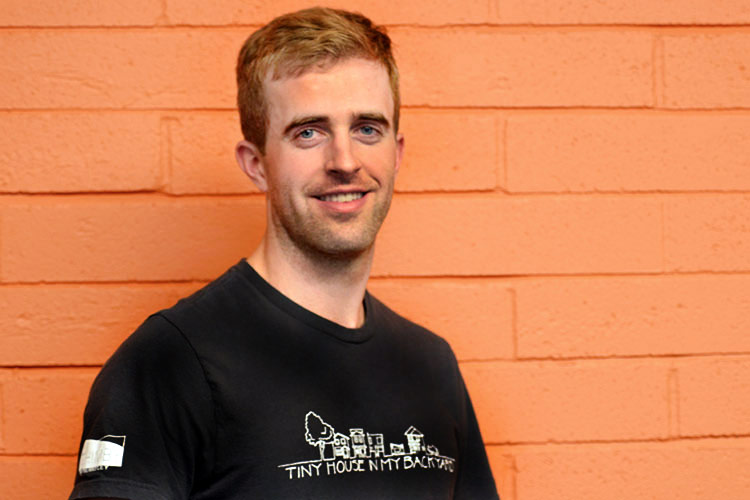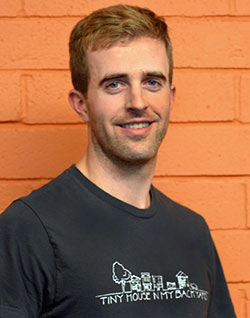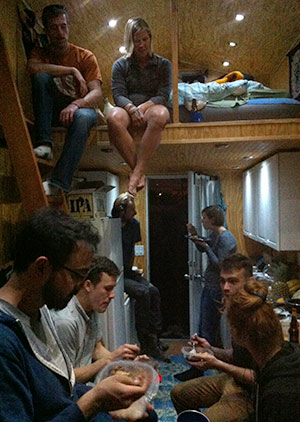Grad student, ‘excited and curious,’ heads for climate summit
Graduate student Ian Bolliger, who studies climate change and its effects on snowpack and water management — and is part of a Berkeley team designing a sustainable tiny house — discusses the 2015 U.N. climate summit and related events he'll attend in Paris.

November 30, 2015
As the 2015 U.N. Climate Change Conference convenes on the outskirts of Paris today, many organizations and individuals committed to environmental advocacy will hold related events in the French capital. Ian Bolliger, a graduate student in UC Berkeley’s Energy and Resources Group, will be among them. A researcher focusing on climate change and its effect on snowpack and water management, Bolliger shares his thoughts on the summit (known as COP21) and the international student meeting he’ll attend, in this Q&A and audio clip.

Ian Bolliger
How optimistic are you about the upcoming climate summit, in light of past failures to reach a meaningful agreement on greenhouse gas emissions?
I’m optimistic, personally. I think that the new approach, using the bottom-up framework — where countries provide their own nationally determined contributions and the agreement is hopefully built up from there — is a better starting point than the top-down approach that they’ve been using in the past. … I think it may open up new avenues for conversations that haven’t existed before. And that’s a valuable first step.
The movement over the last several years has been toward bottom-up approaches, where decisions and actions get done on a smaller scale. I know there’s a delegation of mayors that will be attending. And that a lot of municipal-level governments are trying to demonstrate pathways forward at a scale that’s maybe more workable than starting from a global scale.
It’s really important for both these smaller governments and for grassroots organizations and smaller projects to demonstrate pathways forward, and to show the world that their presence and their concepts are valuable at a major global event.
What will you be doing in Paris?
Three of us — myself and two other grad students from Berkeley — are going to present a project of ours at the Global University Climate Forum, an event put on by the International Alliance of Research Universities. Our project is called Tiny House in My Back Yard (THIMBY), which is an off-grid tiny house we’re designing and building for the Berkeley Global Campus in Richmond, with sponsorship from the Sacramento Municipal Utility District and the student-supported fund TGIF, among others. We’re really excited to go.

Students share dinner in a local tiny house.
How does THIMBY relate to the challenges of climate change?
Our tiny-house project fits into the niche of sustainable housing and affordable housing, which is obviously a very big issue locally in the Bay Area — and in major cities throughout the world. And it also addresses issues of carbon emissions. It’s an off-grid, solar-powered house. It has a small footprint and is designed to be used as infill housing for areas that are experiencing skyrocketing housing prices and displacement, and where they need to house a greater portion of the population, and especially a greater portion of the low-income population.
We’re hoping that THIMBY is at the forefront of the growing tiny-house movement, to help see if this is really a viable option at scale. That hasn’t been demonstrated yet. We believe it is, but we’re hoping to discover that through this project.
What are your personal feelings about the trip? You’ve been giving a lot of presentations on THIMBY, but have you taken part in anything of this scale before?
I think it will hit me most when I’m there. An international climate event on this scale is definitely not something I’ve been to before. It’s something I’ve taken classes on, and heard about from folks who have been to previous COPs. You get an image in the back of your mind of mindless negotiations — because many COPs have broken down in the past. But you also hear from folks who are encouraged by recent developments.
I’m more than anything extremely curious to see what unfolds, to see what roles cities mayors and local governments play in this larger scheme, to what extent the negotiations are actually productive. It’s hard to tell from an outside perspective. Hopefully we’ll be able to attend enough events that we’ll really get a sense for what’s going on. So I’m extremely excited and definitely curious.